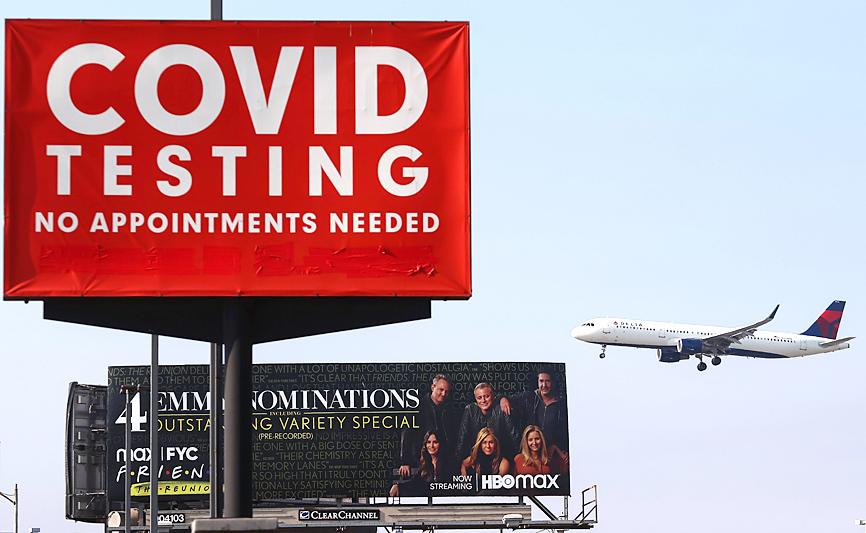Delta Air Lines Inc is to impose a US$200 monthly surcharge on employees who are not vaccinated against COVID-19, becoming the first major US company to levy a penalty to encourage workers to get protected.
The new policy was outlined in a memo from Delta chief executive officer Ed Bastian on Wednesday, who said that 75 percent of the carrier’s workers are vaccinated.
Increasing cases of COVID-19 linked to a “very aggressive” variant are driving the push for all employees to get the shots, he said.

Photo: AFP
The fee applies to employees with coverage through the airline’s healthcare plan who have not received shots by Nov. 1.
The company would also require weekly testing for employees who are not vaccinated by the middle of next month.
Delta stopped short of a mandatory vaccine requirement like the one imposed earlier this month by United Airlines Holdings Inc and other companies.
Goldman Sachs Group Inc, Alphabet Inc’s Google and Facebook Inc have also announced vaccine requirements.
Delta is confident that its approach would succeed in moving its worker vaccination rate beyond 75 percent, a company spokesman said when asked why the company did not impose a mandate.
The potential penalty is “well within” legal parameters, he said.
While vaccine requirements have increased since Pfizer Inc and BioNTech SE’s COVID-19 vaccine on Monday received full US Food and Drug Administration (FDA) approval, employers are treading carefully for fear that they would hurt morale and spur defections in a tight labor market.
Some consultants doubt that surcharges would be as persuasive as demanding inoculation, although the size of Delta’s surcharge could change that calculus.
“Vaccine hesitant employees are likely to see this as a mandate or a punitive measure, as it creates an additional annual cost of US$2,400 for that employee,” Gartner Consulting human resources research head Brian Kropp said.
The fee for unvaccinated employees is “to address the financial risk” from their decision, Bastian said.
The average hospital stay for COVID-19 patients has cost Delta US$50,000 each, he said.
“With this week’s announcement that the FDA has granted full approval for the Pfizer vaccine, the time for you to get vaccinated is now,” Bastian said.
American Airlines Group Inc and Southwest Airlines Co continue to encourage employees to get vaccinated, but have not imposed mandates.
In May, Delta became the first major US airline to require new employees to be vaccinated.
The airline at the time agreed not to mandate vaccinations for its pilots, the only major work group represented by a union, until at least Nov. 21.
The agreement also provided incentives for pilots to get vaccinated.
Under the policy announced yesterday, any worker not fully vaccinated by Sept. 12 would be required to take a weekly COVID-19 test “while community case rates are high,” Bastian’s memo said.
Employees who are not vaccinated must wear masks in all indoor settings, effective immediately, he said.
Delta also said that starting Sept. 30, the airline would preserve full pay for fully vaccinated workers who still get sick and might end up on short-term disability.

In Italy’s storied gold-making hubs, jewelers are reworking their designs to trim gold content as they race to blunt the effect of record prices and appeal to shoppers watching their budgets. Gold prices hit a record high on Thursday, surging near US$5,600 an ounce, more than double a year ago as geopolitical concerns and jitters over trade pushed investors toward the safe-haven asset. The rally is putting undue pressure on small artisans as they face mounting demands from customers, including international brands, to produce cheaper items, from signature pieces to wedding rings, according to interviews with four independent jewelers in Italy’s main

Japanese Prime Minister Sanae Takaichi has talked up the benefits of a weaker yen in a campaign speech, adopting a tone at odds with her finance ministry, which has refused to rule out any options to counter excessive foreign exchange volatility. Takaichi later softened her stance, saying she did not have a preference for the yen’s direction. “People say the weak yen is bad right now, but for export industries, it’s a major opportunity,” Takaichi said on Saturday at a rally for Liberal Democratic Party candidate Daishiro Yamagiwa in Kanagawa Prefecture ahead of a snap election on Sunday. “Whether it’s selling food or

CONCERNS: Tech companies investing in AI businesses that purchase their products have raised questions among investors that they are artificially propping up demand Nvidia Corp chief executive officer Jensen Huang (黃仁勳) on Saturday said that the company would be participating in OpenAI’s latest funding round, describing it as potentially “the largest investment we’ve ever made.” “We will invest a great deal of money,” Huang told reporters while visiting Taipei. “I believe in OpenAI. The work that they do is incredible. They’re one of the most consequential companies of our time.” Huang did not say exactly how much Nvidia might contribute, but described the investment as “huge.” “Let Sam announce how much he’s going to raise — it’s for him to decide,” Huang said, referring to OpenAI

The global server market is expected to grow 12.8 percent annually this year, with artificial intelligence (AI) servers projected to account for 16.5 percent, driven by continued investment in AI infrastructure by major cloud service providers (CSPs), market researcher TrendForce Corp (集邦科技) said yesterday. Global AI server shipments this year are expected to increase 28 percent year-on-year to more than 2.7 million units, driven by sustained demand from CSPs and government sovereign cloud projects, TrendForce analyst Frank Kung (龔明德) told the Taipei Times. Demand for GPU-based AI servers, including Nvidia Corp’s GB and Vera Rubin rack systems, is expected to remain high,